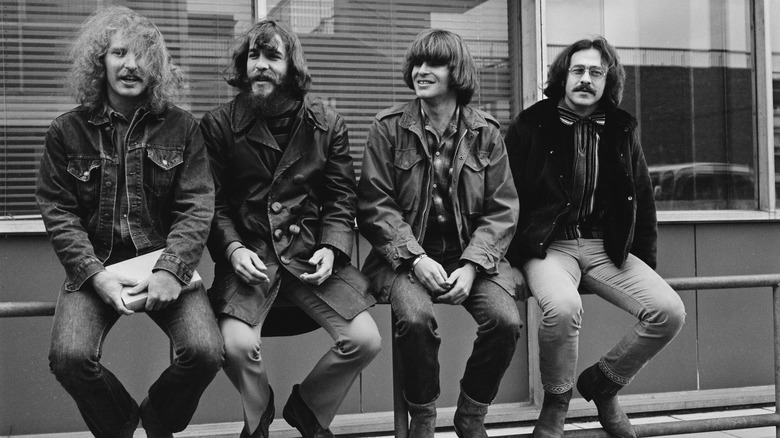What Creedence Clearwater Revival's Surviving Members Are Doing Now
Even if, for some reason, you don't know the name Creedence Clearwater Revival, you know the songs: "Down on the Corner," "Green River," "Bad Moon Rising," "Born on the Bayou," Proud Mary," their rendition of "I Heard it Through the Grapevine," and yes, "Fortunate Son." CCR sported god-tier songwriting chops when they justifiably exploded into overnight fame in the late 1960s and early '70s. They got inducted into the Rock & Roll Hall of Fame in 1993, and to date have sold over 50 million albums, per Concord. Though the group started playing together in the early 1960s, once they reached a bigger audience circa 1968, the band's rise and fall spanned only four years.
It's odd to think that a band with such a lasting musical presence fizzled out so quickly, and over 50 years to boot. As Loudersound recounts, CCR fell apart because lead singer, guitarist, and songwriter John Fogerty took too much on himself. He kept up a blistering songwriting pace for fear of the band falling into irrelevancy, and got possessive about creative control and their contract with Fantasy Records. His brother, guitarist Tom Fogerty got fed up and left the band, and Fogerty disbanded CCR in 1972.
Because of his songwriting skills, Fogerty got a solo deal pretty quickly and released his first, self-titled solo album in 1975. Bassist Stu Cook and drummer Doug Clifford joined the Don Harrison Band for a few albums before forming Creedence Clearwater Revisited in 1995. Tragically, Tom Fogerty died of HIV-related tuberculosis in 1990.
John Fogerty has had a fairly successful solo career
The years immediately following CCR disbanding were a cluttered mess for Jon Fogerty. His brother Tom Fogerty had already left the band, and bassist Stu Cook and drummer Doug Clifford were released from their contracts with Fantasy Records in 1972. Fogerty, however, was not. Fantasy wanted Fogerty to complete his eight-album deal, so Fogerty released John Fogerty/The Blue Ridge Rangers in 1973, a compilation of covers where Fogerty played every instrument. Afterward, he tried to get out of his contract by claiming Fantasy did a bad job at promoting "Born on the Bayou." Fantasy sued him when he stopped writing songs, but Fogerty got a solo contract, anyway.
Things have remained relatively stable for Fogerty since then, if not nearly as successful. Fogerty has marched on, writing, performing, releasing 10 studio albums in the last 50 years, and selling about 5 million copies to date. As Forbes explains, he chased CCR's success for quite some time and tried to claim the rights to CCR songs time and again. By all accounts, he only started coming to terms with his diminished status after performing some CCR songs for crowds of veterans in 1987.
Nonetheless, Fogerty — 79 in 2024 — finally regained the rights to his songs as recently as 2023. He told Forbes, "I think right now I just feel relief that I don't have to keep struggling with it."
Stu Cook joined Creedence Clearwater Revisited
Along with his fellow Creedence Clearwater Revival alum and lifelong friend, Doug Clifford, Stu Cook has kept busy in musical spheres since CCR ended in 1972. In the '70s, Cook set up his own studio called The Factory and formed The Don Harrison Band." But, rather than produce for Harrison he joined the band to play bass for their albums in '76 and '77. Cook also played for The Doobie Brothers' John McFee and Keith Knudsen in Southern Pacific, worked with singer-songwriter Doug Sahm, produced for Roky Erickson, and more.
And of course, come 1995, Cook teamed up with Clifford to form what amounted to a permanent tribute band to their former actual band: Creedence Clearwater Revisited. Legally, Cook and Clifford were able to use the name Creedence Clearwater Revival, but as Loudersound quotes Cook, "We chose not to out of respect for the original band and to avoid unnecessary confusion with our fans." In addition to Cook and Clifford, Creedence Clearwater Revisited sees Creedence's rhythm section joined by lead guitarist Kurt Griffey standing in for Tom Fogerty and Dan McGuinness pulling Jon Fogerty's weight. They also have a fifth member, multi-instrumentalist Steve Gunner.
Creedence Clearwater Revisited hasn't exactly slowed down over the years. In fact, as their official website lists, they've got another tour scheduled for 2025. As the website quotes critic Jeb Wright from 2013, "Creedence Clearwater Revisited not only looks to the past, performing iconic songs, they bring them to the modern day, reminding us all of the true importance of this music."
Doug Clifford also joined Creedence Clearwater Revisited
Much like friend and Creedence Clearwater Revival bassist Stu Cook, Doug Clifford kept busy in the years after CCR disbanded in 1972. "Cosmo," as he was called — short for being a cosmic man of nature, per Forbes – released his own solo album of the same name ("Cosmo") that same year, before joining The Don Harrison band along with Cook. After this, Clifford worked with a litany of musicians in a variety of roles. He name-dropped some of his favorite collaborations in an interview with Psychedelic Baby Magazine, such as working with bassist Duck Dunn from Booker T and the MGs and singer-songwriter Mark Spoelstra as a producer.
Like Stu Cook, Clifford has been a part of Creedence Clearwater Revisited since 1995. As he told Psychedelic Baby Magazine, he remains proud of his work in the original Creedence band and counts "Born on the Bayou" as his favorite song of theirs, which is why Creedence Clearwater Revisited opens every concert with it.
True to his name, Clifford also released a solo, spacey album in 2020 called "Magic Window" that, as his website says, he wrote in 1985 but kept in the vault until COVID-created free time gave him the chance to finish it. He forgot about it in the intervening years but decided to polish it and release it, saying, "Music's always been a medicine and a meditation for me. It doesn't matter if I'm down or up. It works both ways."



